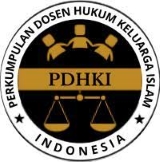ANALISIS KAFA’AH PERSPEKTIF UNDANG-UNDANG DI INDONESIA SYIRIA DAN FIKIH KONVENSIONAL
Abstract
One of the orders for people who want to get married in Islam is to pay attention to the equality of positions between husband and wife (kafaah). Equality is also called balance, which means complementing one another, so as to create harmony between husband and wife. This equality includes education, material, and religion. If this is lame, then there is a fear of being arbitrary and assuming the partner is one-sided. For this reason, some Muslim countries are very concerned about kafa'ah, including Indonesia and Syria. Indonesia, for example, in the Compilation of Islamic Law, kafa'ah is regulated in Chapter X concerning the prevention of marriage. The article states that not being in confederation cannot be used as a reason to prevent marriage, except for not being confederation because of religion or ikhtilafud din. This means that laws in Indonesia do not strictly regulate kafa'ah for physical or material matters. Kafa'ah becomes a big problem and can even be canceled when one partner has a different religion. As for Kafa'ah in Syria, it is regulated in a separate sub-chapter in The Syrian Code of Personal Status in 1953. Kafa'ah is regulated in the 4th part of the 2nd chapter, articles 26-32. The rules regarding kafa'ah read: Kafa'ah between husband and wife is a must in the Syrian state. Kafaa'ah is again regulated in Law No. 34 of 1975 which is a renewal of the previous Law. In this law kafa'ah is regulated in a certain chapter as well, namely part 4 of chapter 2, Articles 52-56. This law says that: in marriage, it is required that there be kafa'ah between the bride and groom, if it is not fulfilled then one of the parties can apply for an annulment of the marriage. Conventional fiqh as a legal reference says that, for example Hanafiah's opinion, the criteria for kafa'ah are lineage, Islam, profession, self-independence and wealth. The criteria for kafa'ah according to Hanafiah tend to be the same as those of Hanbali, except that independence is added. The wealth referred to by the Hanafi school is the ability to pay a dowry and maintenance. Besides the concept of wealth, there is also the concept of character which is the object of kafa'ah. The Hanafi school of thought only considers that character is not an absolute object of kafa'ah. If the prospective husband really shows wickedness, then this becomes a benchmark for kafa'ah in marriage. ¬Asy-Syafi'i¬ argues that the criteria for kafa'ah are nationality or lineage, quality of religion, self-independence and business or profession. ¬Asy-Syafi'i¬ added the criteria for a prospective husband, namely not having a disability.
Keywords
Full Text:
PDFReferences
Abdul Ghafur, Hukum Perkawinan Islam Perspektif Fikih Dan Hukum Positif , Yogyakarta: UII Press, 2011.
Abdullah An-Na’im, A., (Ed.), Islamic Family Law in Changing World: A Global Resource Book, London and New York: Zed Books Ltd., 2002.
Ahmad Warson Munawwir, Al-Munawwir, Surabaya: Pustaka Progressif, 1997.
As-Sayyid Sabiq, Fiqh As-Sunnah, Beirut: Dar Al-Fikr, 1983.
Depdikbud Indonesia, Kamus Besar Bahasa Indonesia, Jakarta: Balai Pustaka, 2005.
Khoiruddin Nasution, Hukum Perdata (Keluarga) Islam Indonesia Dan Perbandingannya Hukum Perkawinan Di Dunia Muslim, Yogyakarta: ACAdeMIA & TAZZAFA, 2009.
Khoiruddin Nasution, Hukum Perkawinan I, Yogyakarta: ACAdeMIA+TAZZAFA, 2005.
M. Quraish Shihab, Tafsir al-Misbah: Pesan, Kesan dan Keserasian Al-Qur’an, Vol: 2, Jakarta: Lentera Hati,2002.
M. Syamsuddin, Operasionalisasi Penelitian Hukum, Jakarta: PT. RajaGrafindo Persada, 2007.
Peter Mahmud Marzuki, Penelitian Hukum, Jakarta:Kencana Prenada, 2010.
Salim HS. dan Erlies Septiana Nurbani, Penerapan Teori Hukum Pada Penelitian Tesis dan Disertasi Jakarta: PT RajaGrafindo Persada, 2013.
Soerjono Soekanto, Pengantar Penelitian Hukum, Jakarta: UI Press, 1986.
Takhayyur adalah memilah milih pandangan salah satu ulama untuk diterapkan di negara tertentu, baca Khoirudin Nasution, “Metode Pembaruan Hukum Keluarga Kontemporer”, UNISIA, Vol. XXX No. 66 Desember, 2007.
The Syrian Code of Personal Status Tahun 1953
Undang-Undang No.34 Tahun 1975
DOI: https://doi.org/10.24952/almaqasid.v9i1.7806
Refbacks
- There are currently no refbacks.
Copyright (c) 2023 Jurnal AL-MAQASID: Jurnal Ilmu Kesyariahan dan Keperdataan

This work is licensed under a Creative Commons Attribution-ShareAlike 4.0 International License.



2.gif)


















